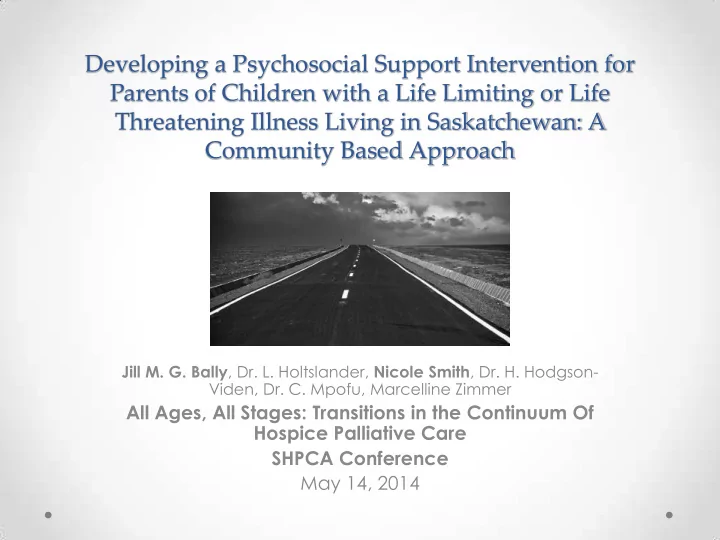

Developing a Psychosocial Support Intervention for Parents of Children with a Life Limiting or Life Threatening Illness Living in Saskatchewan: A Community Based Approach Jill M. G. Bally , Dr. L. Holtslander, Nicole Smith , Dr. H. Hodgson- Viden, Dr. C. Mpofu, Marcelline Zimmer All Ages, All Stages: Transitions in the Continuum Of Hospice Palliative Care SHPCA Conference May 14, 2014
Acknowledgements • Our gratitude is extended to: The participating experts RBC Nurses for Kids Community Development Program for financial support for this research Ronald McDonald House Saskatchewan for their invaluable partnership
Background • Survival rates related to life limiting (LLIs) and life threatening illnesses (LTIs) are improving. Literature about family care does not necessarily reflect this ongoing change • Treatment for childhood illnesses is challenging for parents • Hope is essential and supportive for parents who have children with LLIs and LTIs
Keeping Hope Possible Accepting Reality Establishing Control Restructuring Hope Hoping for the Preparing Best for the Purposive Worst Positive Thinking Bally et al., 2013
Purpose • The overall purpose of this qualitative research study is to develop a theory-based hope intervention to improve the psychosocial and bereavement support of parents of pediatric palliative care patients
Methodology • the research will be carried out by conducting: A metasynthesis of the related literature A Delphi survey Focus groups
Progress to Date • Ethical and operational approval sought and obtained in the fall of 2013 • The metasynthesis is underway • Recruitment began in early 2014 for the Delphi survey and data collection and analysis are currently in progress
Sampling and Inclusion Criteria • Parents, physicians, • Purposive Sampling – nurses, social workers, participants were and community identified by our members who care for research advisory children with a variety committee and invited of childhood illnesses to participate in the who were English study by email speaking, and freely consenting
Data Collection and Analysis • Methods: • The first round of the Delphi survey was sent out and the responses from 64 participants have been collected • Analysis: Each response was entered into ATLAS.ti 7 for organization and management of the data Thorne’s methods of data analysis were adhered to: Three levels of coding Memos Constant comparative analysis
Preliminary Findings • Data collection and analysis currently in progress: • Four subprocesses included ‘accepting reality’, ‘establishing control’, ‘restructuring hope’, and ‘purposive positive thinking’. • Coding ‘accepting reality’ completed.
Preliminary Findings • Accepting Reality Support to access quality resources Encourage parents to ask questions as needed Provide anticipatory guidance
Preliminary Findings Provide and review test results Facilitate connections with other parents Provide time and place for parents to reflect on experience
Implications of the Findings • These findings may inform the practice of health care providers who work within the scope of pediatric palliative care in the acute care, community health, and home settings where, currently, there is very little in place to support such caregivers and families. • Additional research is required to test and develop the hope based intervention.
Comments and Questions Thank you! jill.bally@usask.ca; n.r.smith@usask.ca
Recommend
More recommend